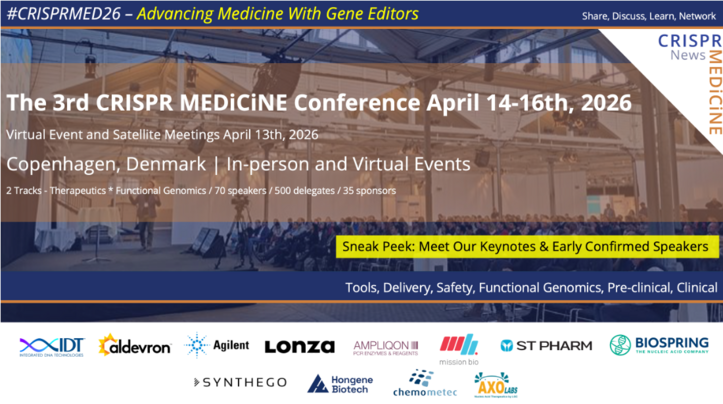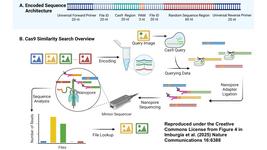CMN Weekly (28 July 2023) - Your Weekly CRISPR Medicine News
By: Karen O'Hanlon Cohrt - Jul. 28, 2023
Top picks
- Researchers at various institutions in the U.S. and Canada report the development of a lipid nanoparticle (LNP) that encapsulates mRNA and is targeted to the stem cell factor receptor (CD117) on haematopoietic stem cells. They show that delivery of the anti-human CD117/LNP-based editing system yielded almost complete correction of haematopoietic sickle cells. Furthermore, in vivo delivery of pro-apoptotic PUMA (p53 up-regulated modulator of apoptosis) mRNA with CD117/LNP affected haematopoietic stem cell function and permitted non-genotoxic conditioning for haematopoietic stem cell transplantation (HSCT). The authors suggest that this new platform could be the basis of in vivo genome editing to cure genetic disorders, which would abrogate the need for HSCT. The findings were published today in Science.
- New CRISPR-based strategies for Alzheimer disease. This research highlight in Nature Reviews Neurology covers two potential novel CRISPR-based therapies for Alzheimer disease, which were reported at the opening day of the Alzheimer’s Association International Conference (AAIC) 2023 held last week in Amsterdam and online. Brent Aulston from UC San Diego presented pre-clinical work demonstrating in vivo injection of CRISPR-loaded adeno-associated virus (AAV) in a mouse model of AD. Using this approach to target the extreme C-terminus of amyloid precursor protein (APP) led to attenuated pathologic β-cleavage products in gene-edited mice by disrupting a pentapeptide “YENPTY” domain at the APP C-term, and reduced plaque formation by approximately 50-60%. The other novel approach, which was presented by Boris Kantor from Duke University, involved allele-specific epigenomic editing of the promoter of the APOE-e4 variant that significantly increases a person’s risk for developing AD. Direct injection of a catalytically-dead (dCas9) construct targeting the APOE-e4 promoter into the hippocampus of mice resulted in a 50-70% decrease in APOE-e4 mRNA and protein levels.
Research
- Anti-CRISPR proteins (Acrs) are natural inhibitors of CRISPR-Cas systems. Understanding how Acrs work will not only shed light on the ongoing arms race between bacteriophage and hosts, but it may also facilitate the development of new tools to regulate the CRISPR-Cas system. In an article published this week in PNAS, scientists in China report the mechanism for AcrIIC4, and demonstrate that AcrIIC4 has a very flexible long helix, and binds to the REC lobe of Cas9. By binding to Cas9, AcrIIC4 effectively disrupts R-loop formation, thereby blocking Cas9 activation.
- Familial hypercholesterolemia (FH) is a prevalent genetic disorder that is linked to early-onset cardiovascular disease. Mutations in the LDLR gene are the primary cause of FH. However, predicting whether novel variants are pathogenic is not a simple task, and better ways to assess the functionality of LDLR variants are crucial to understanding the genetic basis of FH. In an article published earlier this week in Research, a team in China reports the use of CRISPR-Cas9 cytosine base editors in pooled screens to establish a novel approach to functionally assess tens of thousands of LDLR variants on a large scale. More than 100 single guide RNAs (sgRNAs) targeting LDLR pathogenic mutations were successfully screened with relatively high accuracy, 5 of which were subjected to functional verification studies, of which 4 could be confirmed. The authors suggest that this approach could be used as a supplement to clinical gene detection to prevent FH-induced heart disease.
- The topological structures of polymers play a governing role in their gene delivery efficiency. In a recent study, researchers in China and Ireland synthesised a new generation of multi-cyclic poly(β-amino ester)s (CPAEs) with unique topology structure via step growth polymerisation. By controlling the occurrence stage of cyclization, three types of CPAEs with rings of different sizes and topologies were obtained. In vitro experiments demonstrated that the CPAEs with macro rings (MCPAEs) significantly boosted transgene expression compared to their branched counterparts. The team also demonstrated that the MCPAE vector with optimised terminal group efficiently delivered a CRISPR plasmid encoding Staphylococcus aureus Cas9 and dual guide sgRNAs for gene-editing therapy. The findings were published in Journal of American Chemical Society earlier this week.
Industry
- AvenCell announced this week that the European Medicines Agency has approved its clinical trial application for AVC-201, a novel CRISPR-edited allogeneic therapy for the treatment of various blood cancers. AVC-201 is a CD123-directed switchable CAR-T designed to target and eliminate cells that express the receptor CD123, including relapsed or refractory acute myeloid leukaemia and several other blood cancers. The candidate leverages AvenCell's UniCAR universal/switchable technology which allows for the therapeutic activity of CD123 to be switched on and off as necessary, and is also developed using in-licensed allogeneic cell engineering technology developed by Intellia Therapeutics, which allows for unrelated donors to provide cells for patients.
- Sherlock Bioscience announced this week that it will launch a free AI-based operating system for CRISPR diagnostics development. The assay design service will allow users to access Sherlock's novel AI algorithms to create their own tests, and is estimated to reduce assay development time from one year down to three months.
- Editas Medicine announced this week that it has expanded its multi-year partnership with Azzur Group to accelerate Editas’ manufacturing capabilities for advancing the EDIT-301 programme through approval and commercialisation. EDIT-301 is currently being evalaluted in clinical trials for the treatment of severe sickle cell disease and transfusion-dependent beta thalassemia. Clinical data released so far has revealed that a single dose of EDIT-301 leads to persistant improvements in haemoglobin levels with no serious adverse events. Read more about EDIT-301 in our recent clinical trial update here.
- Precision BioSciences has provided updates on its recent Type B End of Phase 1 meeting with the FDA regarding Azer-Cel (PBCAR0191), potential partnerships and timing of its in vivo R&D Day. Azer-Cel is Precision's lead CAR T therapy candidate, which is currently being evaluted in a Phase 1/2 trial for the treatment of acute lymphoblastic leukaemia. In its press release, the company disclosed that the meeting with the FDA provided clarity and direction on azer-cel development, including a potential pathway toward registration.
- Iovance Biotherapeutics announced this week that it will provide oral and poster presentations reporting clinical and pre-clinical data for its tumour-infiltrating lymphocyte (TIL) therapies at the upcoming IASLC 2023 World Conference on Lung Cancer, to be held in September 2023.
Second quarter 2023 financial updates from gene-editing companies
- Cellectis announced this week that it will report financial results for the second quarter ended June 30, 2023 on Thursday, August 3, 2023 after the close of the US market. The announcement will be followed by an investor conference call and webcast on Friday, August 4, 2023, and details about how to access the call can be found here.
- Iovance Biotherapeutics is scheduled to host a second quarter 2023 financial results conference call and webcast on Tuesday, August 8, 2023. See here for further details.
- Allogene Therapeutics is scheduled to report second quarter 2023 financial results on August 2, 2023. The announcement will be followed by a live audio webcast and conference call. Find details about how to join the call here.
- Editas Medicine will announce second quarter 2023 results at a conference call and business update scheduled for August 2, 2023. Details about how to access the call can be found here.
- Intellia Therapeutics is scheduled to hold a conference call to discuss second quarter 2023 earnings and company updates on August 3, 2023. For details on how to access the call, see here.
Reviews
- Killing two birds with one stone: CRISPR/Cas9 CCR5 knockout hematopoietic stem cells transplantation to treat patients with HIV infection and hematological malignancies concurrently. In this review article, authors in Poland and Australia summarise the results of preliminary studies demonstrating that disruption of CCR5 and/or CXCR4 may inhibit viral entry of HIV and prove promising in the development of novel HIV therapies. The authors suggest performing autologous or allogeneic haematopoietic stem cell transplantation with CCR5-knockout haematopoietic stem cells in patients who suffer from complicated HIV conditions, particularly drug-resistant HIV or a concurrent diagnosis of HIV with lymphoma/leukaemia, to achieve complete HIV remission.
- Advances in isothermal nucleic acid amplification methods for hepatitis B virus detection. This review article includes a comprehensive overview of the nucleic acid isothermal amplification technologies currently used to detect hepatitis B virus (HBV). The analytical performances of different methods are compared and their integration with microfluidics, lateral flow assays, and CRISPR-Cas systems is also discussed.
- Utility of CRISPR/Cas mediated electrochemical biosensors. The authors of this review provide a summary of the main principles underlying electrochemical biosensors and CRISPR-Cas systems, and new advances within electrochemical biosensors based on CRISPR-Cas systems in virus, bacteria, and cancer detections. The authors discuss pros and cons, present gaps, potential problem-solvers, and future prospects.
Patent news
- If you are following the years-long CRISPR patent dispute, you can get the latest update here: Amici Support Reversal of PTAB Decision in CRISPR Interference.
News from CRISPR Medicine News
- On Wednesday, we published an updated clinical trial roundup for gene-editing therapies in clinical development to treat beta thalassemia. The update includes trials sponsored by Vertex Pharmaceuticals, EdiGene, Sangamo Therapeutics, BioRay Laboratories, Editas Medicine, and Allife Medicine. You can read the roundup here.
To get more of the CRISPR Medicine News delivered to your inbox, sign up to the free weekly CMN Newsletter here.
Tags
CLINICAL TRIALS
IND Enabling
Phase I
Phase II
Phase III
Recurrent or Progressive High-grade Glioma, (NCT06737146)
Sponsors:
Suzhou Maximum Bio-tech Co., Ltd.
Sponsors:
Suzhou Maximum Bio-tech Co., Ltd.
IND Enabling
Phase I
Phase II
Phase III
Advanced Peritoneal Malignancies or Abdominal Metastatic Solid Tumors, (NCT06912152)
Sponsors:
Zhejiang University
Sponsors:
Zhejiang University
IND Enabling
Phase I
Phase II
Phase III







